Local Superfoods: Elderberry and Chokecherry
Local Superfoods: Elderberry and Chokecherry : One of my favorite ways to enjoy the summer is by collecting local wild berries that are high in antioxidants. Recent laboratory studies have confirmed the anti-viral effects and demonstrated a high content of Vitamin C in elderberries. Elderberry flowers (Sambucus species): The Diegueño, Coast Miwok, Kashaya, Cahuilla and Yuki Indians used the blossoms of Elderberry as a tea to treat fevers, colds and chest congestion. Recipes listed here include: Elderberry Jam, Elderberry Syrup for Colds, Elderberry Wine, Elderberry Bread, Elderflower Champagne, Elderflower Pancakes and Elderflower Liqueur. We also have included recipes for making Chokecherry Fruit Leather, Chokecherry Syrup and a “how-to” description of using the bark for colds. Don’t miss the window to collect them and enjoy throughout the year!
Elderberries
CAUTION Strain out seeds and use only the cooked blue berries of Sambucus nigra subspecies caerulea in moderation, due to the hydrocyanic acid within Elderberry which can cause laxative effects. Avoid raw berries and Red Elderberry, Sambucus racemosa, whether cooked or raw.
ELDERBERRY JAM
3 lbs Elderberries, 1 lemon, 1 package liquid pectin, 4 cups sugar
METHOD
– Remove stems and mash Elderberries. – Cover with water and simmer for 15 minutes. – Strain berries through cheesecloth and save liquid. – Add lemon and pectin to liquid and bring to a boil for 1 minute, stirring constantly. – Add sugar and boil for 2 minutes, stirring constantly.
Elderberry Syrup for Colds
1. Wash berries and remove from stems.
2. Bring 1 cup fresh berries (1/2 cup dried) to 3 cups water to a boil and simmer for 30 minutes.
3. Mash berries, strain, and add 1 cup honey as desired.
4. Can and save for winter colds.
Elderberry Wine *Makes 5 gallons. Ready to drink in 1 year.
▪ 6 gallon pot
▪ 6 gallon bucket with airlock (primary fermentation device)
▪ 6 gallon glass carboy
▪ Iodine (for sterilizing)
▪ Candy thermometer
▪ Flip top bottles or wine bottles with corks and corker
▪ 4 feet of ½” transparent siphon hose
▪ 4 gallons of water
▪ 3 gallons of Elderberries (remove the stalks)
▪ 8 lbs sugar
▪ 1 packet dry wine yeast
METHOD
▪ Remove the Elderberries from the stalks using a fork.
▪ Bring 4 gallons of water to a boil in a pot.
▪ Turn off heat. Stir in sugar until dissolved and then add berries.
▪ Cover and let cool to 70o.
▪ Pour into 6 gallon bucket and stir in yeast.
▪ Cover with lid slightly ajar and store for 3 days.
▪ Cap with airlock and let the airlock bubble and ferment for approximately 10 days.
▪ Siphon into glass carboy, avoiding the yeast and fruit that has settled on the bottom.
▪ Store at 65 – 70o (away from direct sunlight) for 2 months and then move to a cooler location (concrete floor in garage, basement, pantry) for 6 – 9 months. Over time, the bubbling will slow and then completely cease.
▪ Sterilize bottles with iodine, and bottle using corker or flip tops.
▪ For optimal flavor, wait 1 year before enjoying. For long-term storage of more than 2 years, store in wine bottles with corks.
TIP Try a flavorful combination of Elderberry and native Blackberry by using 2 gallons Elderberries and 1 gallon Blackberries.
Elderberry Bread
▪ 3¾ cups rye flour
▪ 1 1/3 cups flour (wheat, Oak nut, or gluten-free substitute)
▪ 5 tbsp ground flax seeds
▪ 1 tsp baking soda
▪ ½ tsp salt
▪ 3¼ cups apple juice
▪ 2 tbsp lemon juice
▪ 2 tbsp vegetable oil
▪ 2 cups Elderberries
▪ 1 cup ground Toyon, Manzanita or Madrone berries
▪ 1 cup raw sunflower seeds
▪ 1 cup shredded coconut
METHOD
▪ Preheat oven to 350o.
▪ Mix dry ingredients in large bowl.
▪ Combine wet ingredients together.
▪ Gradually add wet ingredients into the dry.
▪ Add the Elderberries, ground wild berries, seeds and coconut without over mixing.
▪ Press into 2 oiled bread pans and sprinkle with cinnamon.
Bake for about 1 hour.
Elderflower ‘Champagne’ (non alcoholic)
10 flower heads
2 cups sugar, dissolved in 3/4 cup boiling water
1 ½ tablespoons white wine viniagar
2 lemons, juice and rind
12 cups water
Mix all the ingredients and allow to steep overnight. Strain and bottle into sterilized bottles. Open after 1 week to release air and then reattach lid.
Enjoy after 2 weeks.
ELDERFLOWER PANCAKES
2 cups whole wheat or gluten-free flour 2 tsp baking powder 1 tsp salt 2 eggs, beaten
2 cups milk or milk substitute 2 tbsp vegetable oil 2 cups Elderflowers, without stems (rub flowers between hands to remove from stem)
METHOD
– Stir together flour, baking powder, sugar and salt. – Beat together egg, milk and oil in a separate bowl. – Stir wet into dry ingredients until just moistened. – Fold Elderflowers gently into pancake batter. – Cook on a hot greased griddle, turning when bubbles appear.[1, 48
ELDERFLOWER LIQUEUR
1. Cover 20 or so elderflower umbels with vodka in a mason jar.
2. Seal and let sit for a month.
3. Strain out the liquid, add 1/4 cup sugar, and shake it every couple of days for another month.
(Submitted by Joshua Stark.)
Chokecherries Collect in fall when fruit is dark purple, not red. The fruit was a staple for numerous Indian tribes across the North American continent. Native tribes crushed whole cherries, including pulp, skin and stone, made them into balls and then dried in the sun for use in the winter. Cook or dry the berries before consuming to enhance sweetness and neutralize the naturally occurring hydrocyanic acid.
Chokecherry Fruit Leather: Collect fruit in summer.
4 cups chopped chokecherries, seeds removed; sweetener if desired; lemon
1. Rinse the fruit and remove the seeds. (Store seeds for jewelry making.)
2. Pour fruit into saucepan, adding ½ cup water and simmer for 15 minutes.
3. Try a taste of the fruit, add desired sweetener (sugar, maple syrup, honey, manzanita sugar) and lemon juice as needed, and cook for another 5 minutes until thick. Pour off any excess liquid and save to make syrup if desired.
4. Puree in a food mill, blender or food processor.
5. Pour onto a baking sheet lined with plastic, to about ¼ inch.
6. Dry the fruit leather in the sun with a cheesecloth cover, food dehydrator or oven on the low heat for 8-12 hours.
7. Cut into strips and store in sealed glass jar.
Tip: The fruit leather is ready when it is no longer sticky, but has a smooth surface. Four cups of fruit yield about one baking sheet of fruit leather.
CHOKECHERRY SYRUP
7 cups Chokecherry juice (prepare from ripe berries), 6 cups sugar
METHOD
– Wash fresh or dried cherries and drain well.
– Cover with water and boil until tender, about 15 – 30 minutes.
– Strain through a cheesecloth or fruit press. Preserve the juice and
compost the residue.
– Combine sugar and measured juice and bring to a boil.
– – Boil rapidly for 20 – 25 minutes.
– – Pour into hot sterile jars and seal.
TIP Cooking or drying lessens the bitterness of the raw fruit.
Chokecherry Bark For Colds
Boil bark for 15 minutes and drink for colds, coughs and fever according to the Cherokee Indians. Early physicians used the bark as a tonic to help patients recover from illness, and to relieve irritation of the mucous membranes.




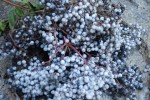
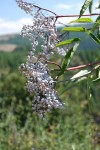
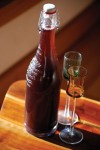
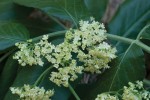
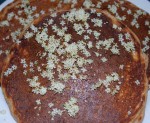


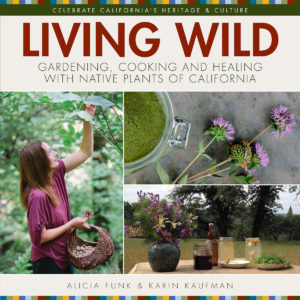
One comment on “Local Superfoods: Elderberry and Chokecherry”
Comments are closed.